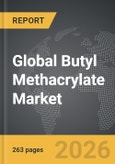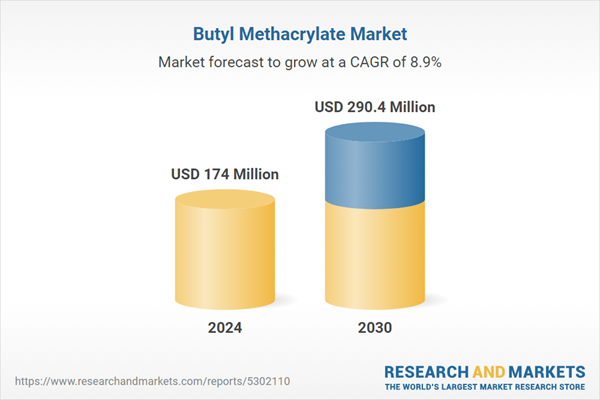Global Butyl Methacrylate Market - Key Trends and Drivers Summarized
What is Butyl Methacrylate and Why is It a Key Ingredient in Modern Chemical Formulations?
Butyl methacrylate (BMA) is a specialized monomer that has become a cornerstone in the production of various resins, coatings, and adhesives due to its unique properties and reactivity. But what exactly is butyl methacrylate, and why is it considered so valuable in chemical manufacturing? Chemically, BMA is an ester of methacrylic acid and butanol, with the molecular formula C8H14O2. It is a colorless liquid with a characteristic ester-like odor and is known for its excellent compatibility and copolymerization potential with other monomers like methyl methacrylate, styrene, and acrylates. This versatility allows BMA to be used in a wide range of applications, from the production of impact-resistant polymers to enhancing the properties of paints, coatings, and adhesives. One of its primary functions is to impart flexibility, weather resistance, and improved adhesion properties to copolymers, making it a critical component in high-performance acrylic resins. Additionally, butyl methacrylate's relatively low volatility and good solubility in organic solvents make it suitable for use in formulations requiring high stability and smooth film formation. As industries increasingly look for materials that combine durability, aesthetic appeal, and environmental compliance, BMA continues to be a sought-after ingredient in both industrial and consumer applications.What Makes Butyl Methacrylate So Versatile in Industrial Applications?
The versatility of butyl methacrylate stems from its unique chemical structure and reactivity, which enable it to function as a building block in creating a variety of high-performance polymeric materials. But what specific properties make it so adaptable across diverse industries? One of the most significant attributes of BMA is its ability to enhance the flexibility and impact resistance of copolymers. When used in combination with harder monomers like methyl methacrylate (MMA), BMA imparts a degree of softness and toughness to the resulting polymer, balancing rigidity and elasticity. This makes it ideal for applications where both structural integrity and flexibility are required, such as in automotive coatings, sealants, and pressure-sensitive adhesives. Another key property is its excellent weather and UV resistance, which makes BMA-based resins suitable for outdoor applications, including exterior paints and coatings. Its hydrophobic nature contributes to water resistance, reducing the likelihood of degradation or peeling in moisture-prone environments. Furthermore, BMA's compatibility with a broad range of other monomers allows for the fine-tuning of polymer properties, such as gloss, adhesion, and hardness, enabling manufacturers to create customized solutions for specific needs. In the electronics industry, for example, BMA is used to produce specialty coatings that protect delicate components from environmental damage. In addition, BMA can act as a reactive diluent in polymer formulations, reducing viscosity and improving flow without sacrificing performance, which is particularly beneficial in the production of high-solid, low-VOC (Volatile Organic Compound) coatings that meet stringent environmental standards.Who Utilizes Butyl Methacrylate, and What Are Its Key Applications?
Butyl methacrylate is used by a wide array of industries, each leveraging its distinctive properties to enhance the performance and durability of their products. But who exactly relies on BMA, and what are its primary applications? The coatings and paints industry is one of the largest consumers of butyl methacrylate, using it extensively to formulate acrylic resins that offer superior adhesion, flexibility, and weather resistance. BMA-based resins are crucial in automotive topcoats, architectural finishes, and industrial coatings, where they provide a balance of hardness and elasticity, ensuring long-lasting protection and aesthetic appeal. In the adhesives and sealants sector, BMA is valued for its ability to create strong, flexible bonds that can withstand thermal and mechanical stress, making it ideal for use in construction materials, automotive assembly, and consumer products. Additionally, the plastic and polymer industry utilizes BMA as a co-monomer in the production of impact-resistant acrylic plastics, enhancing the toughness and processability of products used in signage, display materials, and protective barriers. The electronics industry employs butyl methacrylate in specialty coatings that offer electrical insulation and environmental protection, ensuring the reliability and longevity of sensitive components. Moreover, in the healthcare and medical fields, BMA is used to produce dental resins and bone cement formulations, where its biocompatibility and mechanical properties are crucial for safe and effective performance. This broad range of applications underscores BMA's versatility and importance as a functional ingredient that enhances the quality and performance of products in multiple high-demand sectors.What Factors Are Driving the Growth of the Butyl Methacrylate Market?
The growth in the butyl methacrylate market is driven by several factors, primarily increasing demand from the construction and automotive industries, rising adoption of high-performance coatings, and the expanding use of specialty polymers. One of the main drivers is the robust demand for durable, weather-resistant coatings in the construction and infrastructure sectors. As the global construction industry continues to expand, particularly in rapidly developing regions like Asia-Pacific, there is a growing need for high-quality paints and coatings that offer long-lasting protection and aesthetic appeal. Butyl methacrylate's ability to enhance the flexibility, adhesion, and environmental resistance of coatings makes it a preferred choice for such applications. In the automotive industry, the trend towards lightweight, fuel-efficient vehicles is boosting demand for advanced adhesives and sealants that can bond new materials like composites and lightweight metals, driving the need for BMA-based formulations. Another significant factor is the increasing emphasis on sustainability and environmental compliance. As regulations around VOC emissions become stricter, there is a shift towards low-VOC and waterborne formulations in paints and coatings, where butyl methacrylate plays a crucial role as a reactive diluent and co-monomer that maintains performance while reducing environmental impact. Additionally, the growing use of BMA in specialty polymers for the electronics and healthcare sectors is contributing to market growth. Innovations in polymer science are expanding BMA's utility in high-value applications, such as protective coatings for electronics and biocompatible materials for medical devices. Finally, ongoing research and development aimed at enhancing the properties of butyl methacrylate, such as improving its UV resistance and thermal stability, is opening up new opportunities in emerging fields like 3D printing resins and smart coatings. These factors, combined with technological advancements and a focus on sustainable production, are expected to drive sustained growth in the global butyl methacrylate market in the coming years.Report Scope
The report analyzes the Butyl Methacrylate market, presented in terms of market value (US$ Thousand). The analysis covers the key segments and geographic regions outlined below.- Segments: Application (Molding, Paints & Coatings, Additives, Acrylic Sheets, Other Applications); End-Use (Architecture & Construction, Automotive, Electronics, Other End-Uses).
- Geographic Regions/Countries:World; United States; Canada; Japan; China; Europe (France; Germany; Italy; United Kingdom; Spain; Russia; and Rest of Europe); Asia-Pacific (Australia; India; South Korea; and Rest of Asia-Pacific); Latin America (Argentina; Brazil; Mexico; and Rest of Latin America); Middle East (Iran; Israel; Saudi Arabia; United Arab Emirates; and Rest of Middle East); and Africa.
Key Insights:
- Market Growth: Understand the significant growth trajectory of the Molding Application segment, which is expected to reach US$105.1 Million by 2030 with a CAGR of a 10%. The Paints & Coatings Application segment is also set to grow at 8.9% CAGR over the analysis period.
- Regional Analysis: Gain insights into the U.S. market, valued at $44.8 Million in 2024, and China, forecasted to grow at an impressive 12.9% CAGR to reach $73.2 Million by 2030. Discover growth trends in other key regions, including Japan, Canada, Germany, and the Asia-Pacific.
Why You Should Buy This Report:
- Detailed Market Analysis: Access a thorough analysis of the Global Butyl Methacrylate Market, covering all major geographic regions and market segments.
- Competitive Insights: Get an overview of the competitive landscape, including the market presence of major players across different geographies.
- Future Trends and Drivers: Understand the key trends and drivers shaping the future of the Global Butyl Methacrylate Market.
- Actionable Insights: Benefit from actionable insights that can help you identify new revenue opportunities and make strategic business decisions.
Key Questions Answered:
- How is the Global Butyl Methacrylate Market expected to evolve by 2030?
- What are the main drivers and restraints affecting the market?
- Which market segments will grow the most over the forecast period?
- How will market shares for different regions and segments change by 2030?
- Who are the leading players in the market, and what are their prospects?
Report Features:
- Comprehensive Market Data: Independent analysis of annual sales and market forecasts in US$ Million from 2024 to 2030.
- In-Depth Regional Analysis: Detailed insights into key markets, including the U.S., China, Japan, Canada, Europe, Asia-Pacific, Latin America, Middle East, and Africa.
- Company Profiles: Coverage of players such as Dow Chemical, Evonik Industries, Fushun Donglian Anxin Chemical, Huayi Hefeng Special Chemical, KYOEISHA Chemical and more.
- Complimentary Updates: Receive free report updates for one year to keep you informed of the latest market developments.
Some of the 17 companies featured in this Butyl Methacrylate market report include:
- Dow Chemical
- Evonik Industries
- Fushun Donglian Anxin Chemical
- Huayi Hefeng Special Chemical
- KYOEISHA Chemical
- LG MMA
- Mitsubishi Chemical (Lucite International)
- Mitsubishi Gas Chemical
- Shanghai HeChuang Chemical
This edition integrates the latest global trade and economic shifts into comprehensive market analysis. Key updates include:
- Tariff and Trade Impact: Insights into global tariff negotiations across 180+ countries, with analysis of supply chain turbulence, sourcing disruptions, and geographic realignment. Special focus on 2025 as a pivotal year for trade tensions, including updated perspectives on the Trump-era tariffs.
- Adjusted Forecasts and Analytics: Revised global and regional market forecasts through 2030, incorporating tariff effects, economic uncertainty, and structural changes in globalization. Includes historical analysis from 2015 to 2023.
- Strategic Market Dynamics: Evaluation of revised market prospects, regional outlooks, and key economic indicators such as population and urbanization trends.
- Innovation & Technology Trends: Latest developments in product and process innovation, emerging technologies, and key industry drivers shaping the competitive landscape.
- Competitive Intelligence: Updated global market share estimates for 2025, competitive positioning of major players (Strong/Active/Niche/Trivial), and refined focus on leading global brands and core players.
- Expert Insight & Commentary: Strategic analysis from economists, trade experts, and domain specialists to contextualize market shifts and identify emerging opportunities.
Table of Contents
Companies Mentioned (Partial List)
A selection of companies mentioned in this report includes, but is not limited to:
- Dow Chemical
- Evonik Industries
- Fushun Donglian Anxin Chemical
- Huayi Hefeng Special Chemical
- KYOEISHA Chemical
- LG MMA
- Mitsubishi Chemical (Lucite International)
- Mitsubishi Gas Chemical
- Shanghai HeChuang Chemical
Table Information
| Report Attribute | Details |
|---|---|
| No. of Pages | 263 |
| Published | February 2026 |
| Forecast Period | 2024 - 2030 |
| Estimated Market Value ( USD | $ 174 Million |
| Forecasted Market Value ( USD | $ 290.4 Million |
| Compound Annual Growth Rate | 8.9% |
| Regions Covered | Global |









